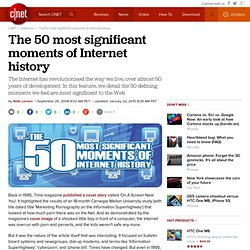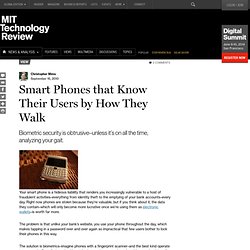

There’s No Success Like Failure: Google’s Biggest Product Flops. Improving Internet Privacy. University of Chicago’s Automated Library Brings You the Future of Research – Today! 95 Shares Google+ 0 Twitter 49 Facebook 27 LinkedIn 19 inShare19 Reddit 0 Pin It Share 0 Buffer 0 95 Shares × Watch out, research is about to get even geekier!

Not only does the new Joe and Rika Mansueto Library at the University of Chicago look like one of the domed ships in “Silent Running”, it’s got a highly automated book storage and retrieval system. The public areas of the library are above ground in a glass and steel dome. We’re so used to seeing wild concepts and wondering if they’ll ever come to fruition that it’s a little jarring to see something like this that is real and has been built. (via Geekosystem) Our email robots can be trusted. Trusted. The 50 most significant moments of Internet history. Back in 1995, Time magazine published a cover story called 'On A Screen Near You'.

It highlighted the results of an 18-month Carnegie Mellon University study (with the dated title 'Marketing Pornography on the Information Superhighway') that looked at how much porn there was on the Net. And as demonstrated by the magazine's cover image of a shocked little boy in front of a computer, the Internet was overrun with porn and perverts, and the kids weren't safe any more.
But it was the nature of the article itself that was interesting. It focused on bulletin board systems and newsgroups, dial-up modems, and terms like 'Information Superhighway', 'cyberporn', and 'phone bill'. Times have changed. We decided to plough the history of the entire Internet, from the roots of its underlying technology, to the Web properties that helped it explode, the litigation it endured on the way and disasters companies have suffered as a result of the Net's popularity.
The early days of the Internet. Microsoft's home of the future lulls teens to sleep with tweets (video) World's tiniest video camera helps doctors see inside of you. Less Than 1 mm in Diameter, the Camera is Used for Medical Endoscopic Procedures OMER, Israel, May 3, 2011 /PRNewswire-FirstCall/ -- Medigus Ltd.

(TASE: MDGS) has developed the world's smallest video camera - just 0.99 mm in diameter. These miniature cameras are manufactured from materials suitable for human medical procedures. They are designed specifically for small-diameter disposable endoscopic devices, used in diagnostic and surgical procedures in regions of the anatomy where larger scopes are not viable. Medical fields in which such tools are required include: cardiology; orthopedics; gastroenterology; gynecology; otolaryngology, bronchoscopy and robotic surgery.
Future Emerging Technologies - FET house. Street Slide: Browsing Street Level Imagery Smart Phones that Know Their Users by How They Walk. Your smart phone is a hideous liability that renders you increasingly vulnerable to a host of fraudulent activities–everything from identity theft to the emptying of your bank accounts–every day.

Right now phones are stolen because they’re valuable, but if you think about it, the data they contain–which will only become more lucrative once we’re using them as electronic wallets–is worth far more. The problem is that unlike your bank’s website, you use your phone throughout the day, which makes tapping in a password over and over again so impractical that few users bother to lock their phones in this way. The solution is biometrics–imagine phones with a fingerprint scanner–and the best kind operate transparently. So-called passive biometrics know who you are based on things you’re doing all the time anyway. For passive biometrics to work, the more measures of the “youness” of you they can gather, the better. Update: The original paper has since disappeared from the web.
Mohammad O. TechFest 2011: Applied Sciences Group: Smart Interactive Displays Blog - Tablet Newspaper (1994)